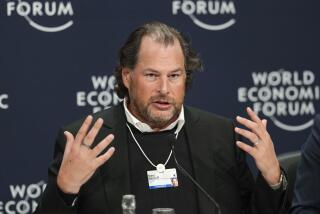No. 2 Man at Microsoft Prefers the Direct Approach
- Share via
As the chartered jet separated from the San Jose runway, Steve Ballmer’s face suddenly lost its color, his booming voice lost its volume and, by all appearances, his stomach was about to lose its lunch.
“Sorry,” he said, taking an anxious glance out the window. “This isn’t the easiest process for me.”
It was a rare moment of vulnerability for one of the most fearless, aggressive and forceful personalities in the high-tech business. It didn’t last long.
As the plane leveled off, Ballmer--Microsoft Corp.’s No. 2 man, Bill Gates’ best friend and one of the world’s wealthiest men--was back in form, tearing open a large bag of potato chips, waving his arms wildly and spouting opinions about the Silicon Valley companies shrinking in the plane’s window.
En route to a trade show in Long Beach last Friday, Ballmer, a man so animated he once blew out his vocal cords at a company meeting, agreed to start off the trip with a game of word association.
Sun Microsystems Inc.
“Weird,” he said. “They put a lot of energy into A but make their money on B. Java [a Sun programming language seen as a threat to Microsoft] is not doing anything for Sun’s workstation sales.”
Netscape Communications Corp.
“Showtime! They got off to a quick start. But they’re no longer a cute little darling. A big part of their business is fighting with us and IBM. There’s not a lot of space between us.”
Apple Computer Inc.
“Time to dig deep,” he said, a grin spreading across his face. “Maybe they should sell Apple-branded Windows PCs. Dell’s market capitalization is about $25 billion. Compaq is worth $30 billion. Apple is worth $3 billion. I know it’s heretical, but it might be good for shareholders.”
In contrast, Microsoft is worth about $150 billion these days, which helps explain why Ballmer alone is worth about $8 billion. But lately he has fretted that Microsoft’s stock is overvalued.
“It’s hard for me to believe we’re worth not just one Ford, but three Fords,” said Ballmer. “We’re worth more then Ford, General Motors and Chrysler combined. That’s my whole hometown!”
Ballmer grew up in Detroit, where his father was a financial analyst at Ford. In many ways, Ballmer’s background is very similar to that of Scott McNealy, the Sun chief executive who spends much of his time bashing Microsoft. McNealy is also from Detroit, where his father was an executive with Chrysler.
In an ironic twist of fate, Ballmer and McNealy met at Harvard in the early 1970s, when McNealy was a freshman and Ballmer stayed in his dorm room while visiting the campus as a high school senior. Harvard also is where Ballmer made another more important connection: Gates.
As the chartered six-seat jet descended into the Southern California smog, Ballmer turned his attention to a thick binder filled with pictures of slides to be used during the speech he was about to deliver at the Long Beach Convention Center.
“This is going to take me three hours,” he groused, crossing off dozens of slides with a red pen and ordering an assistant to make the changes. When that same assistant tried to hand him cue cards with questions to ask representatives from other companies appearing onstage with him, Ballmer scoffed.
“Gee, what technology are we using here?” he rehearsed with mock sincerity. “I’ll just kibitz.”
Sensing Ballmer’s mood, the assistant suggested he could still make wholesale changes to the speech.
“No,” Ballmer said. “I hate this speech, but I can give it. I can steamroll on anything.”
*
Greg Miller ([email protected]) covers Silicon Valley from The Times’ San Francisco bureau.






